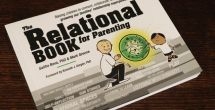Mercy Professor and Family Therapist Promotes Relational Intelligence in Innovative Parenting Book

Associate Professor Dr. Saliha Bava — who teaches marriage and family therapy in Mercy’s School of Social and Behavioral Sciences — co-wrote a book entitled "The Relational Book for Parenting" with Mark Greene. Published in June, the book aims to help families strengthen their relationships and raise a generation of young people who are skilled at connecting, collaborating and innovating.
Bava explains that parents often slip into teaching and telling their children what to do rather than listening and learning with their children. When parenting becomes so serious, children stop paying attention to the lessons their parents want them to learn. Instead, we should aim for “parenting not as a noun but as an activity,” she says, by focusing on the relationship between the parent and child and what they create in the process of relating to each other. Bava and Greene call this capacity to create and care for relationships “relational intelligence.” Not only does relational intelligence make everything more playful and joyful, but it also helps children learn how to learn, think, make, solve problems and relate to others — all skills they need to be successful in tomorrow’s world.
"'The Relational Book for Parenting" is about how parents get parented,” Bava laughs. “As parents, we’re growing along with our children. We’re not just growing them; we’re growing ourselves.”
The book uses a nontraditional structure involving cartoons, fables and activities. Greene — an Emmy Award-winning animator in addition to a writer — believes that cartoons are clear enough to convey information but open-ended enough to enable readers to find themselves in the meaning. They make the content inviting and fun, while the fables and activities encourage parents and children to play and learn together. “We wanted the abstract concepts to be very accessible,” Bava explains. “Most parenting books are about ‘do this’ and ‘avoid this.’ But we want to stimulate the capacity to improvise in the relationship.”
The co-authors decided to focus the book on parenting because they find that people are often willing to explore new ideas in order to help their children, even if not for themselves. However, they assert that the book’s ideas can apply to all kinds of situations such as navigating a marriage or partnership, collaborating with colleagues at work, or teaching others.
Indeed, Bava uses these same principles to help Mercy students become effective therapists. During an orientation she leads every year as students prepare to begin their internships, she talks to them about “creativity and uncertainty and how we create relationships,” she says. “These are the same ideas as in the book but adapted to the space the students are in, which is primarily one of fear and excitement as they start their internships. We talk about how they can stay creative, how they can engage with a client and, through that engagement, learn how to help the client rather than feeling like they have to know everything.”
She appreciates Mercy’s openness to new ideas: “Mercy allows me to bring all of my background and research into the educational space. Teachers can innovate because Mercy recognizes that we all learn by doing — both students and faculty. And innovation is one of the ways Mercy works toward creating equity in education.”
Learning by doing is the method The Relational Book for Parenting supports as well. With the publication of this book, families — and everyone else — can explore new ways of communicating, playing and connecting in order to build stronger relationships and a more connected world.
Learn more about The Relational Book for Parenting by watching this video or ordering a copy of the book.

